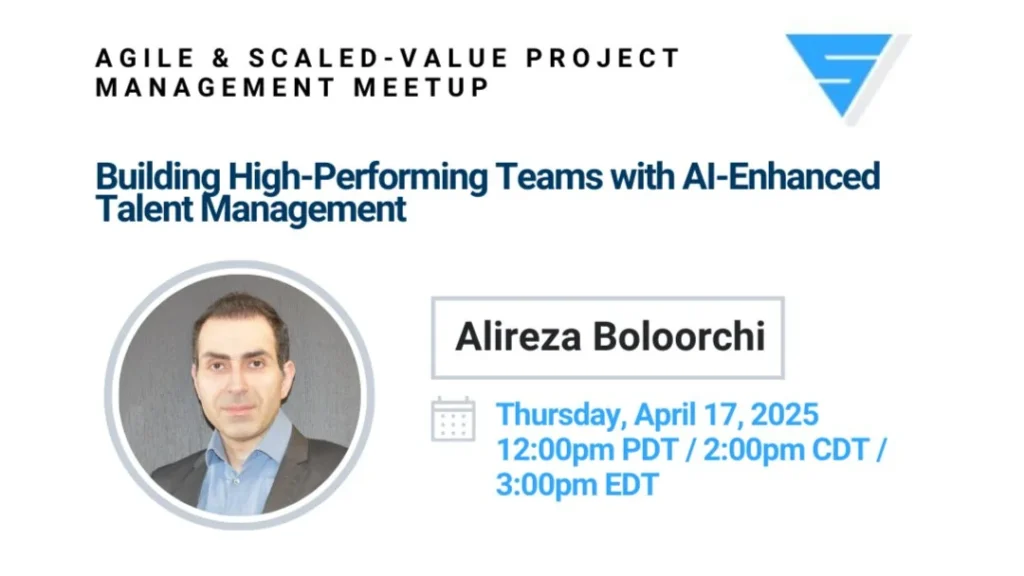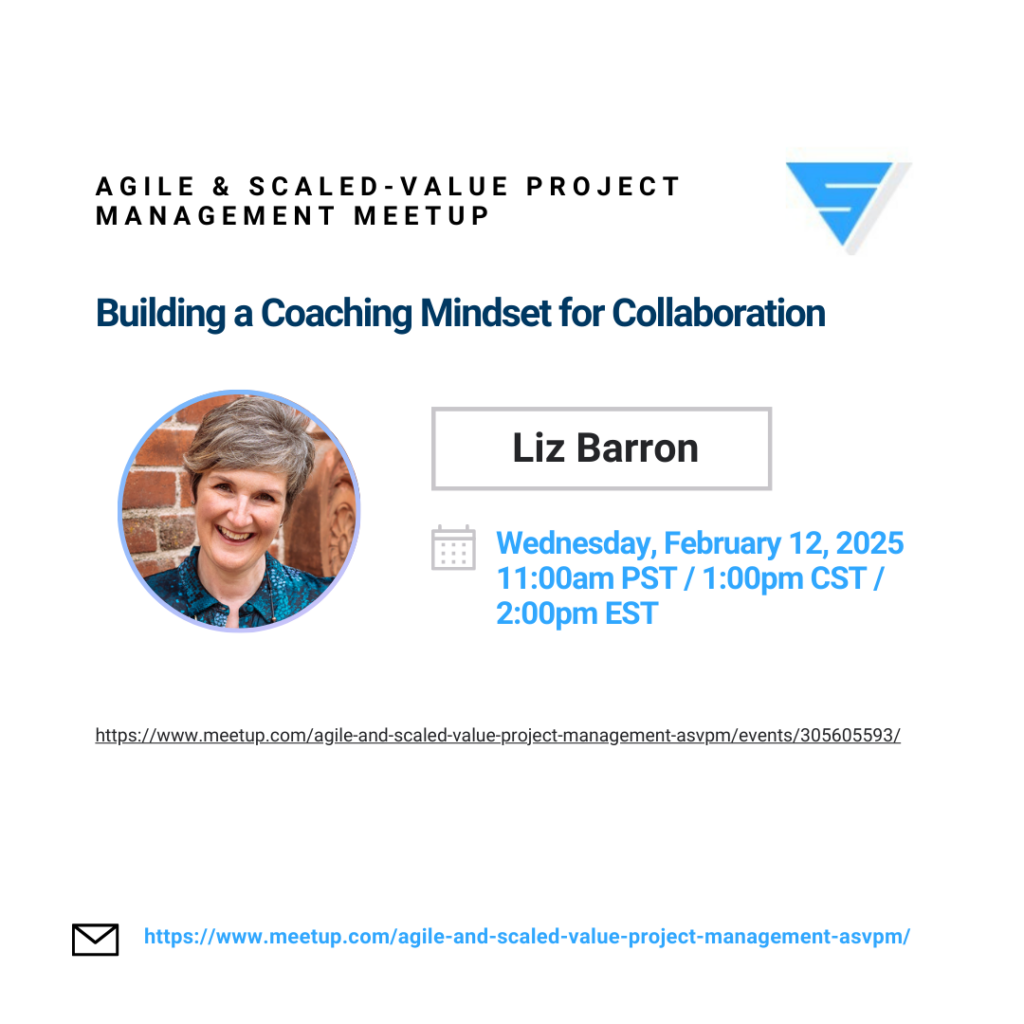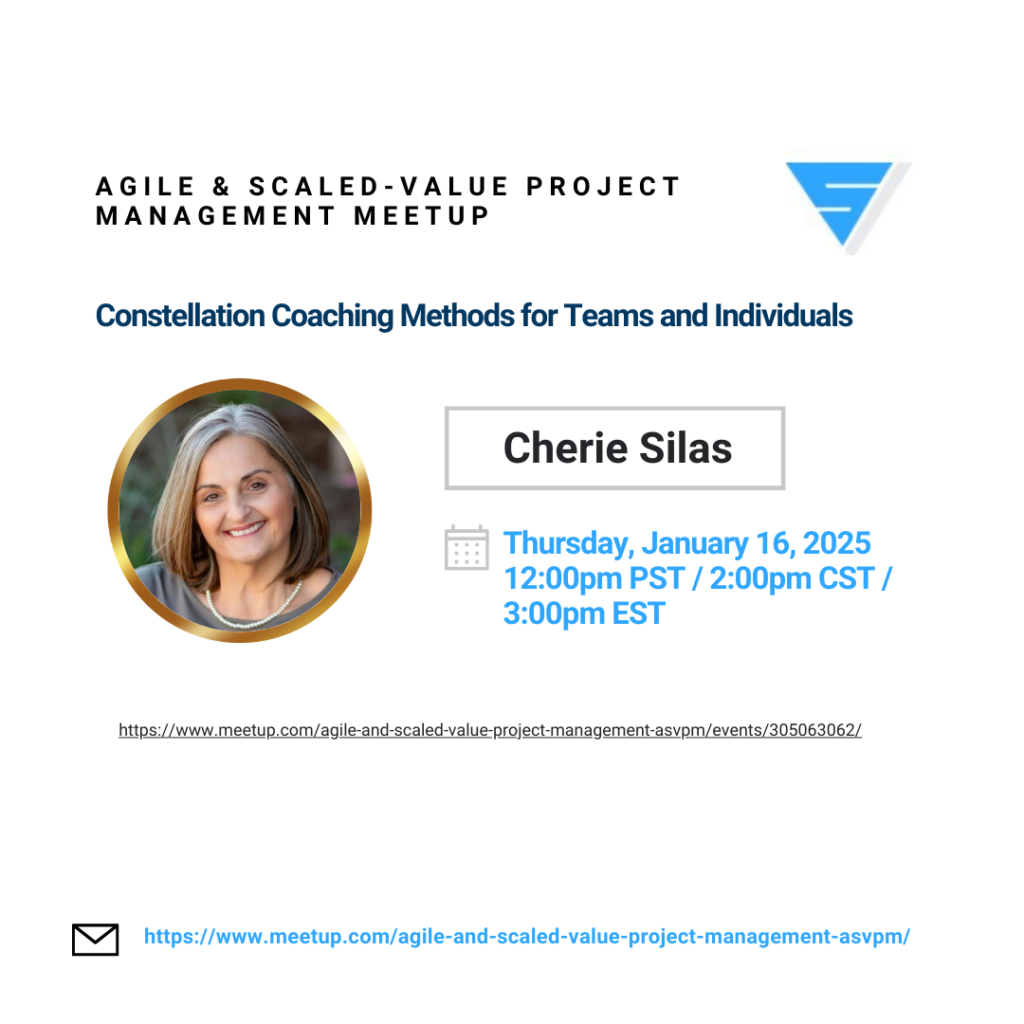Upcoming Event: March 2025
Thursday, May 22nd – 2pm CDT – Supercharging Project/Program Management in the Age of AI: Skills to increase your salary, enhance your career, and deliver more value. – Kyle Dukes
Click HERE to Register.
Most Recent Event: April 2025

Summary:
Traditional leadership has long depended on intuition, manual processes, and fragmented feedback loops. But what if AI could fundamentally reshape talent management—ensuring meritocracy, optimizing productivity, and fostering self-sustaining teams?
Imagine an autonomous AI companion that not only analyzes performance patterns but also prioritizes coaching needs, recognizes high-potential talent, and mitigates disengagement before it happens. By removing hierarchical bottlenecks and enabling decentralized decision-making, AI can empower teams to self-organize, continuously learn, and drive leadership at every level.
In this session, we’ll explore how AI-powered behavioral analytics, real-time feedback loops, and intelligent coaching models can enhance productivity, ensure truly merit-based performance evaluations, and scale leadership beyond a select few. We’ll also address the challenges and ethical considerations of embedding AI into decision-making structures.
This isn’t just about using AI as a tool—it’s about how AI can drive systemic change in leadership and talent management. Join us as we uncover practical frameworks and real-world applications for building AI-driven, high-performing teams that are autonomous, adaptive, and deeply human.
Takeaways:
- AI can eliminate bottlenecks and enhance productivity: AI-powered insights enable real-time feedback and proactive interventions, reducing the need for manual performance tracking.
- AI-driven talent management fosters continuous improvement: Instead of relying on annual reviews, AI helps teams self-optimize through continuous coaching, adaptive goal-setting, and data-informed decision-making.
- Leaders can scale their impact without micromanaging: AI empowers managers by providing actionable insights, allowing them to focus on strategic leadership rather than repetitive performance monitoring.
- AI helps prevent disengagement before it happens: By detecting early warning signs of burnout or disengagement, AI enables proactive leadership actions that improve retention and team morale.
- The shift to AI-enhanced leadership comes with ethical considerations: Transparency, fairness, and responsible AI use are critical when embedding AI into talent management to avoid bias and build trust.
About the Speaker:
Alireza Boloorchi is a seasoned AI and organizational leadership Strategist and Architect. He holds a PhD in Computer Science and has over 15 years of organizational leadership experience across multiple industries. Currently, he serves as the CEO and Founder of Catch Up AI, an autonomous employee performance management platform, and as an Adjunct Professor of Computer Science. Alireza’s career includes a pivotal role as VP of AI Strategies and as the head of the Center of Excellence at a $3B tech startup. Additionally, his extensive experience encompasses key leadership positions at global giants like Visa, KLA-Tencor, and JPMC. In addition to his industry roles, he is a Certified Agile Coach and a trusted advisor to several startups, including serving as a portfolio advisor at Expert Dojo.
Past Events: February 2025

Summary:
This interactive webinar will outline how the core elements of a Coaching Mindset are essential for agile coaches and leaders, and for good collaboration between team members: having a clear goal and purpose; enhancing listening skills and deeper questioning can create a solid foundation for teams to do their best work. You’ll come away with some thoughts on how to further develop your Coaching Mindset, and reflect and learn from your experiences.
Takeaways:
- Listening – how to develop your listening skills to enhance trust & empathy
- Developing Collaborative Goals & Purpose
- Reflecting and learning from our experience
About the Speaker:
Liz Barron is a Professional Certified Coach accredited by the International Coaching Federation since 2019. With a background of over 30 years of experience working in IT Projects & Change management including mentoring and facilitation for Agile teams, Liz first trained as a coach in 2009 and set up her coaching practice. She has worked with individuals and teams across multiple sectors & roles, and at all levels of organizations. Liz has recently completed a Diploma in Systemic Coaching Supervision, aimed at supporting coaches in their ongoing development and reflective practice.
As a coach, Liz’s focus is on helping leaders and their teams to have better, more impactful conversations; improve genuine collaboration, and achieve shared goals.
Past Events: January 2025

Summary:
This session introduces participants to working with human organizational systems and subsystems, emphasizing how coaching systems (groups, teams, relationships) differ from coaching individuals. Participants will learn to facilitate virtual constellation coaching exercises that are both adaptable and repeatable for their clients. These exercises enable clients to visualize the systems they are part of and identify desired changes.
This virtual session will focus on interactive discussions and exercises using digital tools to help participants gain insights into system dynamics and challenges.
Video File / Presentation File
Discover the world of constellations coaching with Master Certified Coach Cherie Silas from Tandem Coaching Academy
Takeaways:
- Clearly define systems and subsystems, and articulate how coaching a system differs from coaching individuals.
- Facilitate virtual constellations using digital tools to help clients visualize and analyze system components and challenges.
- Apply coaching techniques to interpret constellation insights and guide clients toward actionable outcomes.
About the Speaker:
Cherie Silas is an ICF Master Certified Coach (MCC) and a leader in executive and leadership coaching, helping clients achieve personal and professional success. She specializes in building confidence, skills, and executive presence, particularly for motivated high-achievers, including those with ADHD, to focus on conquering their world.
Cherie holds certifications as a Certified Enterprise Coach (CEC), Certified Team Coach (CTC), Certified Organizational Relationship Systems Coach (ORSCC), and Certified Human Systems Coach (TCA-CHS). With extensive experience in organizational management and executive roles across Fortune 500 companies, she has a proven track record in people development and large-scale culture transformations.
As the founder of Tandem Coaching Academy, Cherie developed and has led coaching programs focused on individual, team, and organizational coaching. She also serves as a mentor coach for Tandem and UT Dallas University, an EMCC-accredited coaching supervisor, and the Executive Director of the Center for Non-Profit Coaching, providing professional coaching to non-profit leaders. Cherie’s passion is empowering others to reach new heights, believing that her ceiling should be their floor.
